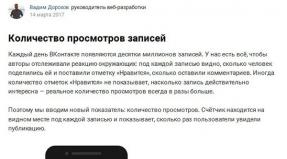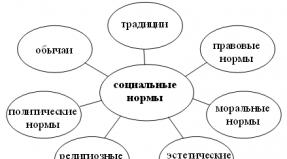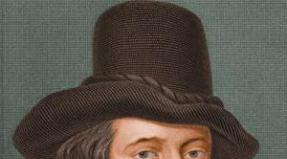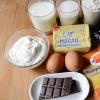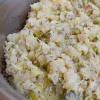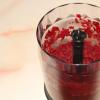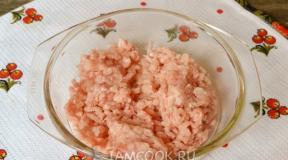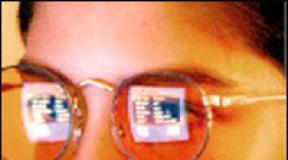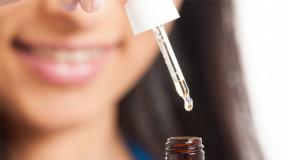Quickly increase the pulse at home - simple recommendations. Zelenin: features of taking drops, contraindications and analogues Zelenin drops how they affect blood pressure
The popular drug "Drops of Zelenin" is used in many cases of cardiac disorders. This article will consider the use of Zelenin drops for bradycardia in adults.
Arterial hypertension - how to increase
To eliminate bradycardia, first of all, you need to determine the exact heart rate in one minute, as well as measure blood pressure, since the pulse is directly dependent on pressure surges. For example: if the pressure shows 90 over 60, respectively, the heart rate will be approximately 40 beats per minute. In this case, in order to radically increase the number of contractions, that is, to remove bradycardia, you need to take drugs that increase pressure.
Doctors usually recommend taking Caffeine, Isadrine, or Askofen. These drugs can only be taken on the advice of a doctor: this is due to the fact that some patients (for example, with Raynaud's disease, coronary heart disease, congenital heart disease, hypertension) are contraindicated in using these drugs - they can only aggravate the situation.
You can also drink a cup of strong black tea or coffee - these products contain caffeine, which can dramatically increase the number of heartbeats. Preparations based on ginseng, eleutherococcus or belladonna have the same effect - they will also increase the pulse in the next three to five minutes. The mechanism of their effective use is due to the ability to quickly tone (spasm) the vessels of the body, and this is what gives a significant increase in pressure, and with it the pulse.
Zelenin drops in the fight against bradycardia
Zelenin drops are also an excellent cleaning agent. Zelenin drops are fast-acting medicines. They should be taken before meals for 20-30 minutes, 20 drops one to three times a day. This tool quickly and effectively increases the pulse.
It should be noted that the initial dose of Zelenin drops is no more than 5 drops during the first three days of treatment. Only after that the dose can be increased and the drug can be taken according to the indicated scheme. Drops can be washed down with water.
Attention! The Zelenin drop preparation is used for bradycardia, and for tachycardia - Corvalol.
Side effects of Zelenin drops
Side effects are usually associated with an overdose of the drug. In this case, there may be a feeling of dry mouth, dizziness, strong heartbeat. After discontinuation of the drug, adverse events disappear on their own.
With prolonged use of Zelenin Drops, it is inhibited, which can lead to a state of apathy, drowsiness, lethargy, loss of appetite, nausea. In all these cases, the drug should be discontinued.
Contraindications to the use of Zelenin Drops
For a normal person at rest, the heart rate should be between 65 and 75 beats per minute. If the heart rate is below 60 beats per minute, then you should consult a doctor and undergo all the necessary examinations.
Symptoms of bradycardia are a significant decrease in heart rate, and only a doctor can prescribe which pills to take to increase the pulse, since this pathological phenomenon requires correction. Treatment is selected individually. To begin with, a comprehensive examination is carried out to establish the reason for the significant decrease in heart rate. The basis of treatment should include drugs that help eliminate the cause of the pathology.
There are several types of bradycardia and drug prescriptions for its treatment:
- There was a slight decrease in heart rate when bradycardia was detected incidentally and is temporary.
- The pulse dropped to 40-50 beats per minute and a concomitant disease of the heart and blood vessels was found.
- The presence of a severe form of bradycardia was found, when no drugs help anymore and there is a threat to life. Surgery is applied.
Let's take a look at each condition and how to treat it.
For mild bradycardia
If the heart suddenly began to work more slowly, the pulse dropped to 60 beats per minute, you need to go to the doctor, do an ECG, and take tests. Especially in older people, this condition can occur if they take drugs such as metoprolol, bisoprolol, propranolol, and other drugs in this group. If bradycardia occurs, these drugs should be stopped immediately and contact a cardiologist.
To treat this stage of bradycardia, the doctor usually prescribes drugs that improve the performance of cardiac activity at the cellular level. They do not affect the normalization of heart rate, but help strengthen the heart muscle:
- Coenzyme Q10 - optimizes all oxidative processes, improves the energy of all body cells, including heart cells.
- Actovegin - improves cell metabolism, promotes the accumulation of glucose and oxygen in the cells of the body.
- L-Carnitine - promotes the activation of cellular metabolism, helps to cope with oxygen deficiency, restores damaged cells.
- Piracetam - improves energy processes at the cellular level, an excellent antioxidant.
- Mexidol - does not allow the oxidation of lipids of cell membranes of all cells of the body. Helps to avoid oxygen starvation of cells.
Middle stage bradycardia
At this stage, medications are prescribed by a cardiologist. When taking these drugs, you must strictly follow the dosage and recommendations of the doctor. Let's take a look at some of these drugs.
Drugs for bradycardia
Zelenin drops with bradycardia. This remedy will help increase your heart rate. It acts very quickly, improving the patient's condition. You need to take these drops from one to three times a day before meals, 20 drops each. The doctor, prescribing this drug, must explain to the patient that at the beginning of treatment for two or three days, the dose should not exceed five drops per dose.

Mildronate with bradycardia – this drug is prescribed by a doctor for any heart disease - heart failure, ischemia. In the middle stage of bradycardia, it must be prescribed to the patient for the prevention of stroke and heart attack. In addition, the drug is used for increased physical exertion.
Panangin is prescribed to saturate the body with potassium and magnesium, which helps to strengthen the heart. It is taken in courses in the form of tablets or intravenously.
Corvalol, thanks to peppermint oil, phenobarbital and ethyl bromizovallerianate, relieves spasms, calms the nervous system and promotes fast falling asleep. It is taken for tachycardia.
Cordiamin- taken in violation of cardiac activity, with shock, asphyxia, poisoning.
Valerian- you can use tablets, decoctions or alcohol tinctures to calm, relieve muscle spasms.
Asparkam prescribed for heart failure, ischemia, hypokalemia, cardiac arrhythmias. A source of potassium and magnesium, asparkam helps restore electrolyte balance and restore heart rhythm.
Valocordin taken as a sedative. In some cardiovascular diseases, the patient begins to panic. It is worth taking 20 drops of valocordin tincture, nervous tension is removed, and the heart rhythm is restored.
Concor used for hypertension. This drug can cause bradycardia, or an increased heart rate. If the patient has bradycardia, then the appointment of this drug requires observation in the hospital, although some patients with arrhythmia tolerate this drug and experience relief.
Amlodipine- used to treat hypertension. With caution, this drug is prescribed to patients with severe bradycardia and tachycardia.
Euffilin used in acute heart failure.
Atropine sulfate is used in severe bradycardia, with a sharp deterioration in the condition. The drug has a pronounced specific effect, therefore it is taken only in severe cases. Self-administration of this drug is contraindicated!
Adrenalin used only on prescription in the most severe cases. Contraindications - trachioarrhythmia, myocardial infarction.
Bellataminal used for neurosis, insomnia, concussion.
Preductal the doctor may prescribe for the treatment of coronary heart disease, angina attacks.
Vitamins for bradycardia
At the first sign of a heart rhythm disturbance, it is necessary to change your lifestyle. Remove sugar from the table, reduce the amount of salt, eat only wholemeal bread, remove fatty foods. Of course, the doctor will tell the patient about this.
It is necessary to take vitamins that will strengthen the heart and improve well-being.
Here is a list of vitamins that you should pay special attention to:
- Coenzyme Q10 will help solve many coronary problems, increase blood flow to all organs, provide the heart muscle with good nutrition,
- Vitamin E. Its purpose is to provide cells with oxygen, as well as improve blood circulation, lower bad cholesterol, and cleanse blood vessels. Regulates the contraction of the heart muscle.
- Vitamin C. Its purpose is the fight against atherosclerosis. It helps to strengthen the walls of blood vessels, prevents unplanned blood clotting, helps to overcome stress, reduces cholesterol levels.
- Vitamin F - destroys saturated fats, which form sclerotic plaques.
- Vitamin B6 - helps to relieve spasms of blood vessels and normalizes the blood supply to the heart.
Bradycardia is not always dangerous. Only a doctor is able to determine the norm and the presence of pathology. The pulse indicates the state of the patient's cardiovascular system, evaluating which the doctor determines the degree of filling of the artery. A slow heart rate indicates changes in the heart system, possible pathologies manifested by bradycardia.
Indicators of the onset of bradycardia
The pulse begins to slow down when the central organ of blood circulation does not respond well to the physical load of the body. The normal heart rate is approximately 60-90 beats per minute, physical activity forces the rhythm to rise to 150 beats.
The condition when the rhythmic movement of the walls of the arteries, felt below the wrist, is less than 60 beats per minute, is called bradycardia and means a slowdown in cardiac activity. Often, a decrease in heart rate is not a cause for concern, on the contrary, muscle load decreases, the central organ of blood circulation rests.
If the frequency is 50 beats / min., This indicates severe bradycardia and indicates the presence of a serious pathology. This speed is not enough, the heart is not able to pump enough oxygen-rich blood.
Etiology of bradycardia
There are many diseases that are manifested by a slow pulse. But there are reasons that are the normal physiological state of the patient.
- Adults who exercise regularly feel their heart rate slow down.
- Elderly people are also prone to low heart rate, aging causes weakening of the heart muscle.
An examination should be carried out to make sure that there is no disease. If the heart is not able to pump enough blood, unpleasant symptoms and complications occur.
Physiological factors that can provoke a reduced contraction of the heart muscle include hypothermia, body training and heredity. Reasons for low heart rate:
- congenital heart defects;
- sinus node dysfunction;
- atherosclerosis;
- the electrical impulse moving from the upper to the lower chamber of the heart is irregular, blocked;
- myocardial infarction, the presence of scars on the heart muscle;
- low pressure;
- hypothyroidism;
- myocarditis, endocarditis.
Deceleration of the heart rate appears in patients suffering from non-cardiac pathologies.
Other reasons:
- the use of certain drugs;
- increased intracranial pressure;
- starvation;
- lead poisoning (nicotine);
- hemochromatosis (accumulation of iron);
- rheumatic fever;
- inflammatory diseases.
There are several factors that can increase the risk of developing bradycardia:
- age;
- smoking;
- alcohol abuse;
- psychological stress;
- anxiety.
Signs characteristic of bradycardia
A very low pulse leads to various symptoms. The clinical picture of the disease depends on the pressure of the patient, other factors and pathological conditions.
Symptoms of bradycardia at normal pressure
A low pulse is sometimes observed in an absolutely healthy patient. Normal blood pressure and bradycardia are nothing to worry about. A similar condition appears after active training and prolonged physical exertion. In this case, the appearance is characteristic:
- distorted perception of the position of the body in space;
- difficult breathing;
- poor memory, forgetfulness;
- thinking disorders;
- nausea.
A decrease in pulse against the background of normal pressure is the cause of heart defects of various etiologies.
High blood pressure clinic
Low heart rate and high blood pressure are alarming symptoms. This condition occurs in older patients. High is considered to be pressure, the indicators of which exceed 140/90. Often, a low pulse occurs in patients during the period of adaptation to medications. Signs:
- migraine;
- weakness;
- vomit;
- noise in ears;
- nausea;
- chest pain.
A low pulse with high blood pressure can cause:
- myocardial blockade;
- vegetative dystonia;
- endocarditis;
- side effects of certain drugs.
Signs of low blood pressure
A pulse below normal often appears against the background of low blood pressure, in women the figure is 95/60, in men - 100/60. The heart rate is 30-50 beats per minute. This condition does not appear on its own, it indicates the presence of an anomaly and requires an immediate medical examination. Signs of a low heart rate at a pressure of less than 95/60 are:
- loss of a sense of balance;
- severe fatigue;
- severe weakness;
- fainting due to insufficient oxygen.
The reasons for this condition are:
- pathology of the heart, internal organs;
- poisoning;
- drug overdose;
- hypothermia.
Treatment of bradycardia
Before prescribing treatment, you should undergo a diagnosis. Doctors first of all direct patients to undergo:
- electrocardiogram;
- coronarography;
- atropine tests.
After receiving the test results, the doctor prescribes treatment.
Therapy at pressure 140/90
If a low pulse occurs at the same time as high blood pressure, emergency medical attention should be provided.
- Apply water compresses to the collar area,
- put the victim on a flat horizontal surface,
- give Corvalol a drink.
Treatment of patients with a low pulse on the background of hypertension is based on the use of:
- ACE inhibitors;
- alpha-blockers;
- angiotensin receptor blockers.
You can not use beta-blockers, this type of medicine helps to reduce the number of heartbeats.
Treatment for blood pressure below 95/60
With low blood pressure, temporary relief is brought by:
- drinks with caffeine;
- strong tea;
- natural dark chocolate;
- ginseng extract;
- eleutherococcus.
Only a doctor has the right to prescribe medication. It is strictly forbidden to regulate the dosage of drugs on your own. In difficult cases with reduced pressure, an ambulance should be called to avoid death. Doctors will administer adrenostimulants intravenously.
Measures at normal pressure
First of all, it is necessary to determine the cause of the low pulse against the background of the patient's normal pressure. If the reduced heart rate does not bother the victim, you should take:
- water with Zelenin drops;
- tincture of ginseng, belladonna;
- Eleutherococcus extract.
With severe bradycardia, you can not use folk remedies or medicines on your own. You should immediately call a doctor, such a problem means the presence of a serious pathology that threatens the health of the patient.
The danger of a low pulse is the appearance of constant fainting, heart failure. In severe cases, death is possible. Therefore, heart health must be taken responsibly. With problems related to the cardiovascular system, you should go to a cardiologist.
Zelenin drops: composition and purpose
Zelenin drops belong to the group of cardiac medicines. They have a cardiotonic, sedative, antispasmodic and analgesic effect. They are usually recommended for patients who complain of a low heart rate (HR). Despite the fact that on the Internet there are mostly positive reviews about Zelenin drops for bradycardia, it is advisable to read the instructions before using them for treatment. Individual intolerance to some components can provoke unpleasant side reactions.
Composition
 Zelenin drops are a herbal remedy. They are prescribed for disorders of the nervous system, diseases of the digestive tract and biliary tract, functional abnormalities in the work of the heart or blood vessels. The drug has several active ingredients presented in the table.
Zelenin drops are a herbal remedy. They are prescribed for disorders of the nervous system, diseases of the digestive tract and biliary tract, functional abnormalities in the work of the heart or blood vessels. The drug has several active ingredients presented in the table.
| belladonna tincture | Reduces the production of salivary, sweat, gastric and other glands of the body, relaxes the muscles of the gastrointestinal tract and biliary tract. |
| Valerian tincture | It has a calming and sedative effect. It mainly affects the nervous system, helps to slow down the rhythm. |
| Lily of the valley tincture | Enhances myocardial contraction, thereby improving the blood supply to this area. |
| Menthol | Endowed with coronary dilating and ananginal properties. Helps prevent angina attacks and other manifestations of coronary insufficiency. Promotes vasodilation, against which improvements in the work of the myocardium are achieved. |
The scheme of application of the drug
According to the instructions for the use of Zelenin drops, with bradycardia, adults should drink from 20 to 25 drops. 2-3 times a day. Before that, they must be diluted with a small amount of drinking water.
In the case of treating children, the dosage is calculated based on the age of the child. Patients over 12 years old are entitled to as many drops as they are. The duration of therapy is determined individually for each patient.
 Treatment should begin with a small dose of the drug. For the first time, it will be enough to take 5 drops, and this amount must be divided into 2 doses. On the fourth day of treatment, the dosage is increased to 20 drops and adhere to this scheme until the end of the course.
Treatment should begin with a small dose of the drug. For the first time, it will be enough to take 5 drops, and this amount must be divided into 2 doses. On the fourth day of treatment, the dosage is increased to 20 drops and adhere to this scheme until the end of the course.
The tool quickly enough helps to cope with bradycardia and effectively increases the heart rate. Exceeding the recommended dose is extremely dangerous, because in this case, adverse reactions cannot be avoided. Before taking Zelenin drops for bradycardia, you should consult a doctor.
Functional action and indications for use
This drug was developed to combat cardiac neuroses, which are caused by a functional disorder of the myocardium. A person may face similar problems after a strong emotional shock. They also arise due to an asthenoneurotic reaction or autonomic innervation of the heart.
Atropine, which is contained in belladonna, has a complex effect on the body. This substance has a wide therapeutic spectrum. Its main clinical effects include the ability to:
- relax muscles;
- dilate the pupils of the eyes;
- increase intraocular pressure;
- expand the bronchi;
- reduce limb tremor in patients suffering from Parkinson's disease;
- reduce the production of digestive glands.
Zelenin drops are prescribed mainly for bradycardia. With the help of this drug, you can quickly stabilize the heart rate. The duration of its action deserves special attention. The result after taking the medicine can last for several hours.
 A similar effect is due to the presence of atropine, which is contained in belladonna. This substance reduces the effect of acetylcholine by blocking M-cholinergic receptors. Thus, it is possible to muffle the excitation of the vagus nerve, which acts as a link in the parasympathetic division of the nervous system. The stronger the tone of the indicated nerve, the better the increase in heart rate.
A similar effect is due to the presence of atropine, which is contained in belladonna. This substance reduces the effect of acetylcholine by blocking M-cholinergic receptors. Thus, it is possible to muffle the excitation of the vagus nerve, which acts as a link in the parasympathetic division of the nervous system. The stronger the tone of the indicated nerve, the better the increase in heart rate.
In addition, Zelenin drops are successfully used for renal and hepatic colic, VVD, irritability, chronic cholecystitis, anacid, hypoacid and hyperacid gastritis. As for the indications for the use of Zelenin drops for tachycardia, it is better to consult a specialist with this question.
Contraindications
Due to the fact that drops can increase heart rate, their use in tachycardia is not recommended. Other contraindications include:
- cardiovascular diseases;
- stomach ulcer;
- individual intolerance to one of the components of the drug;
- glaucoma.
Side effects of Zelenin drops
The drug itself rarely causes adverse reactions. Some disorders in the body can only be observed with an overdose.
The most common side effect is allergy. This is due to the presence of belladonna tincture in the drug.
Excessively high dosage can lead to increased heart rate, dizziness and drying of the oral mucosa. These symptoms usually disappear after you stop taking Zelenin drops.
Therefore, an overdose of the drug most often leads to such unpleasant consequences:
- dizziness;
- dry mouth;
- dilation of the pupils of the eyes;
- rapid heartbeat (arrhythmia);
- accommodation disorder.
As the drug is removed from the body, all the ailments that the patient had to endure should disappear. It rarely requires symptomatic treatment.
When the duration of taking the drug is exceeded, the nervous system suffers, against which the following reactions of the body may occur:
- heartburn;
- loss of appetite;
- allergy;
- nausea;
- apathy and drowsiness;
- headache;
- indigestion;
- vomit.
To prevent the occurrence of such consequences, you must strictly follow the scheme prescribed by the doctor. The systematic use of Zelenin drops in the presence of bronchial asthma and their combination with the preparations "Berotek", "Izadrin" requires special control over the reaction of the body. If these drugs are used at the same time, you can provoke an increase in the heartbeat. To read reviews about the effectiveness of the drug or find out what its price is, just visit a specialized website where medical and pharmaceutical products are sold.
During treatment, the patient must be especially careful when driving. The drug is able to act on the speed of psychomotor reactions. Therefore, people whose activities are associated with an increased risk of injury, it is advisable to refrain from working with traumatic mechanisms.
medicinal forms. Zelenin drops- a complex preparation, which includes: tinctures of May lily of the valley and valerian 10 ml each, belladonna tincture 5 ml, menthol 0.2 g.
Medicinal properties. The complex of drugs that make up Zelenina drops. provides moderate stimulation of the heart, has a calming and antispasmodic effect.
Indications for use. The drug is prescribed for neuroses of the heart, accompanied by a decrease in the work of the heart, spasms of the vessels of the heart.
ATTENTION! Zelenin drops are used for bradycardia, and Corvalol - in the presence of tachycardia.
Application rules. The drug is taken orally 30 minutes before meals, 20-25 drops per reception 2-3 times a day, with 0.5 glass of water.
Side effects and complications. Undesirable effects are usually associated with an overdose of drops. First of all, side effects may be associated with the presence of belladonna tincture. Perhaps the appearance of dry mouth, increased heart rate, dizziness. Undesirable effects disappear after discontinuation of the drug. Prolonged use of Zelenin drops can lead to CNS depression, which can manifest itself in drowsiness, apathy, lethargy, slowing of the heart, loss of appetite, nausea. In these cases, the drug should also be discontinued.
ATTENTION! With the systematic use of Zelenin drops by patients with bronchial asthma, along with Berotek, Salbutamol, Isadrin, etc., caution should be exercised because of the risk of heart palpitations.
Contraindications. The drug can not be used for glaucoma, tachycardia, hypertension.
Storage. In a dark cool place, away from fire. Shelf life 2 years.
Zelenin drops: what are they intended for and how to take them?

Today we will tell you about what Zelenin drops are, what they are for, how to use them, etc. In addition, you will be presented with reviews from consumers who have used or are currently using this drug.
General information
Zelenin drops are a combined phytopreparation with cardiotonic, antispasmodic and sedative effects. This tool was developed by a clinician, Soviet therapist, doctor of medical sciences, honored worker of science of the RSFSR (in 1946) and academician of the USSR Academy of Medical Sciences (in 1944) Vladimir Fillipovich Zelenin.
The composition of the drug
Zelenin drops are a herbal medicine that includes tinctures of May lily of the valley, belladonna leaves, valerian and menthol.
Appearance and release form

The presented drug is available in dropper bottles made of dark glass, 25, 20, 30, 40 or 15 ml each. One cardboard pack contains detailed instructions for use, as well as a jar with a transparent and slightly brownish liquid with a pronounced aroma of tinctures.
Drug properties
The complex of herbal remedies that are part of the presented drops has an antispasmodic and calming effect, and also provides moderate stimulation of the heart muscle.
pharmachologic effect
The antispasmodic and sedative effects of Zelenin drops are due to the presence of plant components in it. To understand why this tool is popular with consumers, consider the principle of its operation in more detail. To do this, we will talk about the properties of the herbal tinctures that make up the medication:
- Lily of the valley tincture. This drug has a cardiotonic effect.
- Belladonna leaves. This tincture significantly reduces the secretion of sweat, gastric, bronchial, salivary and lacrimal glands, as well as the pancreas. In addition, the mentioned plant has m-anticholinergic and antispasmodic effects.
- Menthol. The presented component acts as a local irritant. In addition, it has analgesic, coronary dilating, venotonic, antianginal and reflex action.
- Valerian root tincture. Such a remedy has an antispasmodic and sedative effect, and also accelerates the onset of natural fast sleep. It should be especially noted that the sedative effect of this component is stable, although it occurs rather slowly. Among other things, valerian root significantly slows down the heart rate, dilates the coronary vessels, has a choleretic effect and increases the secretion of the mucosa of the gastrointestinal tract.
Indications for the use of the drug

According to the attached instructions, Zelenin drops should be used in the presence of the following pathological conditions:
- hypo- and anacid gastritis;
- irritability;
- hepatic colic;
- vegetative-vascular dystonia;
- spasms of the gastrointestinal tract;
- renal colic;
- biliary dyskinesia;
- hyperacid gastritis;
- chronic cholecystitis;
- as part of combination therapy - heart failure in a chronic form;
- increased excitability;
- reduced appetite.
Contraindications to the use of the drug
The drug Zelenina (drops) is not recommended for use with the following deviations:
- intolerance to the main components of the drug;
- prostatic hypertrophy, which occurs with violations in the outflow of urine;
- angle-closure glaucoma;
- gastritis (hyperacid);
- myocarditis;
- peptic ulcer (including erosion of the mucous membrane) of the duodenum and stomach;
- endocarditis;
- under the age of 13.
Instructions for use of the drug

Zelenin drops should be taken orally half an hour before meals several times a day (2 or 3 doses per day). According to the attached instructions, the amount of the drug for adults and adolescents should not exceed 20-30 drops (in a single dosage). In this case, it is advisable to drink the drug with half a glass of water.
Side effects
The drug itself never causes side effects. But with an overdose, patients may experience allergic reactions. Experts associate this manifestation with the presence of belladonna tincture in the pharmacy. Thus, at incorrect doses, a person may experience palpitations, dry mouth, and dizziness. As a rule, all of these side effects disappear immediately after stopping the use of the drug. It should also be noted that prolonged use of Zelenin drops often leads to depression of the central nervous system. This manifests itself in the form of drowsiness, lethargy, apathy, loss of appetite, slowing of the heart and nausea. In such cases, it is better to abandon the use of the medication and use another remedy of a similar effect.

Attention!
Those who regularly use the presented drug should be aware that:
- With the systematic use of Zelenin drops in patients with a diagnosis of bronchial asthma with the simultaneous use of drugs "Izadrin", "Salbutamol", "Berotek" and so on. special care must be taken. This is due to the fact that this combination of medications can lead to a very rapid heartbeat.
- During the period of therapy, special care must be taken when driving vehicles, as well as engaging in other hazardous activities that require good vision, speed of psychomotor reactions and increased concentration.
- Some consumers confuse Zelenin drops with Corvalol medicine. In this regard, it should be remembered that the first drug is used for bradycardia, and the second - in the presence of tachycardia.
Interaction with other tools
With the simultaneous administration of Zelenin drops with hypnotic drugs that depress the central nervous system, the effects of these drugs are significantly enhanced.
Shelf life and storage conditions

Zelenin drops must be stored out of the reach of a young child and in a slightly cool place (at a temperature not exceeding 25 ° C). The shelf life of this drug is exactly two years from the date of manufacture.
Zelenin drops: consumer reviews
Reviews about this tool are very diverse. Some consumers claim that this is a good sleeping pill that effectively protects against nightmares and panic attacks. This drug is easy to use (you only need to drink 20 drops), there are no "chemicals" in it. Zelenin drops are much more effective than other herbal remedies. Moreover, such a medication is especially attractive for those who are not ready to pay a large amount for a pharmacy drug. Other users have noted that the belladonna leaves included in this remedy have the side effect of severely dilated pupils. In this regard, the eyes of some patients become sensitive to bright light, and also quickly get tired after working at the computer. It is also worth noting that after taking Zelenin drops, many consumers immediately begin to feel sleepy. That is why they are recommended to be taken only in the evening.
Zelenin drops

Many products of the pharmaceutical industry are based on natural plant extracts that have one effect or another. Thus, the soothing properties of valerian, belladonna and lily of the valley have been used in the manufacture of Zelenin drops. A cocktail of tinctures of these herbs, created by the director of the Institute of Therapy, Zelenin V.F. was prescribed for women with neurosis, mainly associated with stress, premenstrual syndrome and overwork.
Composition of Zelenin drops
The drug includes natural ingredients. Let's consider their properties in more detail.
Belladonna tincture (Belladonna)
This plant is known for its poisonous properties due to its chemical composition. In the Middle Ages, it was used to induce hallucinations, and more severe poisoning was accompanied by convulsions, a sharp drop in pressure, and an increase in temperature could cause death from respiratory paralysis. But nevertheless, minimal doses of belladonna have a therapeutic effect and are used for kidney stones and bronchial asthma. The ability to increase the contractility of the internal sphincters with a parallel decrease in the tone of the gastrointestinal tract is used in the treatment of gastritis and inflammatory diseases of the gastric mucosa.
Valerian tincture
Valerian officinalis is famous for its calming and natural sedative effect, which is due to the essential oils and alkaloids contained in it. Valerian is widely used as an independent preparation for calming the nervous and cardiac systems, and as a constituent component in collections.
May lily of the valley
This plant is most often used in the perfume industry. Just like belladonna, it is a poisonous plant and, if ingested, can cause convallatoxin poisoning. Poisoning is accompanied by an increase in blood pressure with a violation of the heart rhythm (arrhythmia) up to cardiac arrest. In medicinal doses, it is used for tachycardia and acute or chronic heart failure, because. has cardiotonic properties.
Menthol
Widely used in pharmaceutical, food and cosmetic industries. It has a cooling effect, aromatizes, has a slight local anesthetic effect.
Indications for the use of Zelenin drops
Zelenin drops are prescribed and taken in the presence of diseases and symptoms such as:
- increased nervous excitability;
- dysmotility and inflammation of the biliary tract;
- spasmodic manifestations of the gastrointestinal tract;
- renal colic;
- inflammatory diseases of the gastric mucosa (gastritis);
- decreased appetite.
Zelenin drops are also prescribed for bradycardia. At the beginning of treatment, Zelenin drops are prescribed in the minimum dose - 5 drops in the first three days. Then, with good tolerance, the dose is increased.
Contraindications for the use of Zelenin drops
Due to the ability to increase the heart rate, Zelenin drops are not recommended for tachycardia. Also direct contraindications of Zelenin drops are:

This drug reduces concentration, which affects driving and other activities that require close attention.
Reception drops Zelenina
This drug is taken on an empty stomach (20-30 minutes before meals) at a dosage of 20-30 drops in half a glass of water. To achieve a therapeutic effect, it is recommended to take the drug 2-3 times a day.
Bradycardia is not an independent disease. It often indicates serious malfunctions in the cardiovascular system. In case of heart rhythm disturbance, not only medications are used, but also folk methods. Before using herbal tinctures and medicinal decoctions that increase the pulse rate, you should consult a doctor.
Contraindications to the use of medicinal herbs for bradycardia
Before proceeding to the discussion of the issue: "symptoms and treatment of bradycardia", let's consider in more detail the contraindications to the use of medicinal plants. It should be noted that tinctures of medicinal herbs should not be taken with individual sensitivity to their components.
The composition of many decoctions used in the treatment of bradycardia and other cardiovascular pathologies includes foxglove.
The herb has a lot of useful properties, but you need to be careful when using it. Digitalis is a poisonous plant, so you need to take it under the supervision of a doctor. It is not recommended to drink decoctions based on this medicinal product for people with chronic diseases of the digestive tract.
Belladonna is also actively used in the treatment of bradycardia. The medicinal herb increases the heart rate. But belladonna is also a poisonous plant. It is forbidden to take it with atherosclerosis, prostate adenoma, serious lung diseases, exacerbation of ulcerative colitis.
Are alternative methods of treatment effective for severe forms of bradycardia?
Do not forget that with a severe form of bradycardia, the patient has such adverse symptoms as lowering blood pressure, dizziness. In this case, a person may suddenly lose consciousness. Some people get chills: they resemble an ornamental flower bent by a light breeze. This category of patients should regularly take medications. In a severe form of pathology, decoctions and tinctures of medicinal herbs should be drunk in combination with stronger drugs prescribed by a doctor.
It is possible to treat patients suffering from bradycardia with Zelenin drops. This herbal preparation is endowed with antispasmodic and sedative properties. The composition of the drops includes the following ingredients:
- Leaf of belladonna, popularly referred to as the wild berry.
- Menthol.
- Valerian root.
- Lily of the valley tincture.

Infusion based on yarrow will help to cope with bradycardia!
Yarrow increases appetite, normalizes the work of the cardiovascular system. To prepare the infusion, you need to take 10 grams of vegetable raw materials. Dried grass is poured into 0.2 liters of boiling water. The mixture must be put on fire, it is boiled for 15 minutes. After this, the remedy must be insisted for at least an hour. Then the infusion is filtered, it should be taken 10 ml before meals. As soon as the pulse returns to normal, it is recommended to stop taking the infusion. If the patient's state of health worsens (a decrease in the pulse rate), the treatment is resumed.
A treasure trove of nutrients!
What if a person was diagnosed with bradycardia, and treatment with known folk remedies did not give the desired result? The patient needs to try a mixture of walnuts and sesame oil. This drug helps to strengthen the heart muscle, improves immunity. This remedy has a tonic effect on the body. It is prepared like this:
- 4 small lemons are cut into five equal parts, pour 1000 ml of boiling water over them.
- After 25 minutes, the fruit is passed through a meat grinder, the juice formed when chopping lemons does not need to be drained.
- Then 0.5 kg of finely chopped nuts, 0.2 kg of sugar and 0.2 l of sesame oil are added to the lemons.
- The mixture is transferred to a clean jar, it must be stored in a cold place.
It is necessary to take 10 ml of the drug mixture 30 minutes before meals. The duration of the treatment course is one month. This mixture contains quite a lot of fat, so it is forbidden to take it to people with chronic liver diseases. If pain occurs in the right hypochondrium, the drug should be stopped.

Healing mixture of lemon, honey and garlic
This mixture strengthens the walls of the heart, eliminates nervousness. The tool is prepared according to the following scheme:
- You need to take five medium-sized lemons, five heads of garlic, 0.5 liters of honey.
- Lemons are scalded with boiling water, cooled. After that, juice is squeezed out of them, finely chopped garlic and honey are added to the resulting mass.
- The mixture is transferred to a glass container, insisted in a place protected from direct sunlight. The tool must be shaken periodically.
The drug is drunk 40 ml once a day half an hour before meals. The duration of the course of treatment is 45 days. This mixture should not be taken by people who have increased acidity of gastric juice. It can not be drunk with inflammatory diseases of the digestive system, individual sensitivity to the ingredients of the remedy.
Collection of medicinal plants for bradycardia
To prepare the drug, you need to take 10 grams of calamus, 20 grams of dandelion roots, 10 grams of currant leaves. These components are poured into 0.2 liters of boiling water. The mixture is infused for at least 30 minutes, then it must be filtered.
You need to drink 100 ml twice a day. The duration of the course of treatment is at least two weeks.
How to increase the effectiveness of the treatment of bradycardia with folk remedies?
In order to reduce the likelihood of a new attack of bradycardia, stress and strenuous exercise should be avoided. The patient must maintain his weight in the norm, eat right. In the diet of a person suffering from bradycardia, you need to include foods that improve the functioning of the organs of the cardiovascular system. If there are signs of an allergic reaction to any folk remedy, you should stop taking the medicinal decoction and consult a doctor.
cardioplanet.ru
Composition
Zelenin drops are combined preparations of plant origin. Active ingredients included in the composition:
- Belladonna tincture.
- Valerian officinalis tincture (rhizome).
- Tincture of lily of the valley herb.
- Racementhol.
The scheme of application of the drug
Zelenin drops for bradycardia are used in courses, the duration of which is determined by the therapist after examining the patient. The first few days you need to take the remedy 4-5 drops, dividing this dose into 2 times. On the 4th day, the amount is increased to 15-20 drops per day and continue to drink according to the same scheme until the end of the course of treatment.
 Zelenin drops are diluted with a small amount of water and drunk 15 minutes before breakfast and the same time before dinner. The tool has a quick effect and effectively increases the heart rate. You should not independently increase the dose of the drug, since in case of an overdose, serious side effects may occur.
Zelenin drops are diluted with a small amount of water and drunk 15 minutes before breakfast and the same time before dinner. The tool has a quick effect and effectively increases the heart rate. You should not independently increase the dose of the drug, since in case of an overdose, serious side effects may occur.
Side effects
Zelenin drops with bradycardia, used in high doses, can provoke the following phenomena:
- dry mouth;
- increased heart rate (arrhythmia);
- dizziness;
- pupil dilation;
- disturbance of accommodation.
After stopping the pharmacological agent, the patient ceases to feel unwell. In some cases, symptomatic treatment may be required.
If the medicine is used longer than the prescribed time, then the nervous system is depressed and the following reactions of the body occur:
- apathy;
- lethargy;
- drowsiness;
- bouts of nausea;
- vomit;
- allergy;
- gastralgia;
- heartburn;
- disorders of bowel functions;
- headaches;
- decreased appetite.
 The appearance of the described signs indicates the need to discontinue the drug.
The appearance of the described signs indicates the need to discontinue the drug.
Contraindications
In no case should the drug be used during attacks of tachycardia. Drops are also contraindicated in diseases such as:
- angle-closure glaucoma;
- hypertension;
- prostate hypertrophy, accompanied by urinary outflow disorders;
- cardiosclerosis;
- myocarditis;
- endocarditis;
- atherosclerosis of the heart vessels, developing in a pronounced form.
Zelenin drops with bradycardia can be used for treatment only as directed, after visiting a doctor and consulting. In case of violations of the heart, self-medication is unacceptable, as it can lead to complications and serious diseases!
serdceinfo.ru
The structure of the conduction system of the heart and the causes of bradycardia
The heart is made up of muscle tissue (myocardium). She covers it from the outside, and lines the internal sections - the ventricles, atria and valves. The sequence of its contractions ensures normal blood flow through the vessels. The activity of the organ is regulated by the brain, and the distribution of incoming nerve impulses is regulated by the conduction system. It is represented by the following structures:
- sinus or sinoatrial node, located in the upper part of the right atrium;
- the atrioventricular or atrioventricular node is located just below the sinus node, in the interatrial septum;
- the Hiss bundle (or atrioventricular) has a complex structure, its processes (right and left legs) connect the atria and ventricles, ending in the myocardial tissue on their inner wall.
Also, a complex system of various types of receptors takes part in the propagation of impulses. Reacting with specific enzymes, they regulate the processes of excitation and relaxation of the heart. With bradycardia, disturbances can affect any of these segments. Moreover, if we are not talking about physiological arrhythmia, changes in the structure of the myocardium and the conduction system are irreversible.
Therefore, the appointment of drugs for bradycardia can rather be attributed to symptomatic therapy. By influencing receptors located directly in the heart or blood vessels that feed it, the tablets, injections or tinctures used normalize the rhythm of contractions, increase blood pressure and significantly improve the quality of life of patients with such pathologies. To prescribe this or that drug, the doctor needs to accurately determine the cause of the development of bradycardia. These symptoms can be caused by:
- features of physical fitness, almost all people involved in active sports are prone to slow heartbeat, which does not require treatment;
- severe hypothermia;
- long-term use or overdose of antihypertensive drugs;
- infections;
- hypothyroidism.
Also, rhythm disturbances can be caused by metal poisoning, pesticides, and drugs. However, the main cause of this symptom is the pathology of the cardiovascular system. In this case, drugs for bradycardia should be taken for a long time. Possible treatment by surgical intervention.
Drugs to increase blood pressure
Hypotension, in addition to bradycardia, is accompanied by symptoms such as dizziness, weakness. With a sharp decrease in pressure, fainting is possible. The most common drug for the treatment of this condition is Caffeine-Sodium Benzoate 200 mg tablets. They are recommended to be taken 2-3 times a day, but the maximum daily dose should not exceed 2 g for an adult and 500 mg for children.
The limitation on the amount of the drug is associated with the peculiarities of its action. Caffeine directly excites the cerebral cortex. This stimulates blood vessels and increases the heart rate. However, in high doses, these bradycardia pills have the exact opposite effect. It should be noted that at normal or elevated pressure, this medicine does not change it, but at low pressure it raises it to a physiological level.
For long-term treatment, Caffeine-Sodium Benzoate is not suitable. It "works" for a short time and does not affect the cause of the development of the disease. At the first symptoms of bradycardia and hypotension, you can take other medicines containing this substance. These are Citramon, Askofen, Cofitsil.
Doctors recommend nootropics as a long-term therapy. They not only normalize blood pressure, but also improve blood circulation in the brain, stimulate memory, attention and other mental processes. Piracetam is usually prescribed (its full analogues are Nootropil, Lucetam, Memotropil) at a dosage of 2.4-4.8 g per day in 2-3 doses. Correction of this amount is required in violation of the excretory function of the kidneys and liver.
From the same group of drugs, Picamilon, Aminalon, Idebenone can also be recommended. However, the listed drugs are contraindicated in pregnancy, high blood pressure. They also should not be taken if bradycardia attacks are replaced by tachyarrhythmia or other heart rhythm disturbances. A condition such as glaucoma requires special care.
Drugs that act on receptors in the tissues of the heart
The main problem with the use of a similar group of drugs for bradycardia is the localization of the receptors they act on. They are located not only in the myocardium of the heart, but also in the smooth muscles of the uterus, bladder, lungs and bronchi, and organs of the digestive tract. Therefore, with prolonged use of this type of drugs, the development of complications and side effects is inevitable. The main task of the doctor is to choose a medication (or a complex of several drugs) that best suits a particular patient.
Some drugs that cause a rapid increase in the rhythm of the heartbeat are administered intravenously, so they can only be used in a hospital setting. After stabilizing the condition and determining the exact cause of bradycardia, the person is transferred to pills that are more suitable for home treatment. The list of drugs for the relief of symptoms of bradycardia is limited. First of all, it is Atropine hydrochloride, a medicine from the group of M-anticholinergics.
The main active ingredient of drugs for bradycardia is an alkaloid contained in some plants (Belladonna, Henbane, Datura). After application, it causes severe tachycardia, but does not affect the level of blood pressure. In addition, Atropine hydrochloride inhibits the secretion of bronchial, digestive, sweat, lacrimal and salivary glands. Its side effects include dry mucous membranes, a decrease in sweating causes an increase in temperature. It is used at a dosage of 0.5 - 1 mg intravenously, while monitoring the heart rate and blood pressure is necessary, if there is no effect, it is allowed to repeat the injection after 5 - 7 minutes. The daily amount should not exceed 0.4 mg per kg of body weight;
Drugs of choice for bradycardia
Isoprenaline is used for bradycardia accompanied by hypertension. In addition, it relaxes the smooth muscles of the bronchi, so it is widely used in bronchial asthma. For the treatment of slow heart rate, it should be taken at a dosage of 2.5 - 5 mg sublingually (under the tongue until completely absorbed) up to four times a day. For the treatment of severe symptoms of bradycardia, the drug is prescribed intravenously at 2–3 μg per kg for a minute until the condition is completely stabilized;
Isadrin is an analogue of isoprenaline and is similar to the natural stimulant, adrenaline, but its effect is longer. Dosage and method of application of Isadrin completely coincide with Isoprenaline. The symptoms of bradycardia are also relieved by such remedies as Theophylline or Eufillin. However, these tablets have a greater effect on receptors located in the muscles of the bronchi.
If the slowing of the heartbeat is accompanied by bouts of tachycardia, the use of a special group of drugs - antiarrhythmic drugs is required. These are Gutron, Amiodarone, Cardiodarone. However, they are contraindicated in bradycardia caused by disruption of the sinus node of the conduction system of the heart. Therefore, before their appointment, a thorough examination of the patient is necessary; it is also recommended to start taking them in a hospital setting.
Natural medicines for the treatment of bradycardia
Herbal preparations for bradycardia are much safer than synthetic ones (with the exception of drugs containing belladonna extract). However, taking such drops or tinctures is recommended for a mild form of the disease, when the heart rate is not lower than 50 beats per minute. If the patient has a moderate (40-50 strokes) or severe (less than 40 strokes) type of pathology, they should be combined with synthetic drugs. Positive feedback from patients received such means:
- Zelenin drops have a complex composition. The preparation contains plants such as May lily of the valley, Valerian officinalis and belladonna and peppermint essential oil. Zelenin drops have a combined effect. The belladonna increases the heart rate and relieves the symptoms of bradycardia, lily of the valley has a cardiotonic effect, and valerian slightly reduces blood pressure and helps to normalize sleep. They should be taken orally, 15-20 drops 2-3 times a day on an empty stomach, diluted with a small amount of boiled water at room temperature;
- hawthorn tincture is classified as an antiarrhythmic drug. The therapeutic effect is due to the high content of flavonol glycosides and saponins in hawthorn fruits. Due to this composition, the drug has a cardiotonic effect. In addition, the tincture lowers the level of cholesterol in the blood. It is recommended to take it at a dosage of 20-30 drops 3-4 times a day. The course of treatment is at least 20 days.
As an adjunctive therapy, tinctures for bradycardia are recommended, containing ginseng, Manchurian aralia, eleutherococcus senticosus, Schisandra chinensis. Their action is similar to Nootropil. They stimulate blood vessels, slightly increase blood pressure and heart rate (HR). In addition, when the patient's condition is satisfactory, they increase the effectiveness of synthetic drugs used to treat the disease.
It must be emphasized that only a doctor should decide which medications to take for bradycardia. However, with the ineffectiveness of drugs, surgical intervention is indicated. It consists in the installation of so-called pacemakers or pacemakers. Such a device independently generates impulses and transmits them through the myocardium.
It is selected individually, taking into account the severity of the symptoms of bradycardia in the patient. The operation refers to radical methods of treatment. The technique of intervention has long been worked out, and is characterized by a low risk of complications. However, despite certain lifestyle restrictions, the installed pacemaker allows you to avoid long-term medication.
kakiebolezni.ru
Instructions for use
Zelenin drops have the following effects:
- antispasmodic;
- cardiotonic;
- anesthetic;
- calming;
- speeds up the heart rate.
Indications:
- bradycardia;
- vegetative dysfunctions.
Contraindications:
- benign prostatic hyperplasia;
- glaucoma;
- organic pathologies of the heart and blood vessels;
- kidney pathology;
- allergy;
- pregnancy;
- lactation;
- age up to 12 years.
The drug contains ethyl alcohol, which must be taken into account by drivers or persons undergoing treatment for alcohol dependence.
It is undesirable to take Zelenin drops to representatives of professions whose work is connected with the control of mechanisms or requires an increased reaction.
Side effects:
- drowsiness;
- decrease in mental and physical performance;
- oppression of emotions;
- visual impairment;
- headache;
- diarrhea;
- constipation;
- vomit;
- dry mouth;
- tachycardia;
- muscle weakness;
- increase in body temperature.
Overdose symptoms are similar to side effects. Only proceed in a more pronounced form.
How to take Zelenin drops?
Usually Zelenin drops are available in 25 ml bottles. Take them 20-25 drops, 2-3 times a day.
Children's dosage (not earlier than from 12 years old) - one drop per year of life. After 18 years, an adult dose is prescribed.
Composition
Zelenin drops contain 4 active ingredients:
- lily of the valley- stimulates the contractility of the heart muscle (cardiotonic effect);
- belladonna- a source of atropine (blocker of m-cholinergic receptors), which in one way or another affects many organs and systems;
- valerian- has a calming effect;
- menthol- when taken orally, it has no therapeutic properties.
What helps?
 Zelenin drops are designed as a treatment for heart neuroses. These are functional disorders of the myocardium. They can be caused by emotional instability of a person, asthenoneurotic reactions, or provoked by disorders of the autonomic innervation of the heart muscle.
Zelenin drops are designed as a treatment for heart neuroses. These are functional disorders of the myocardium. They can be caused by emotional instability of a person, asthenoneurotic reactions, or provoked by disorders of the autonomic innervation of the heart muscle.
Atropine, which is part of belladonna, has a comprehensive effect on the body. Knowing the range of its clinical effects, one can find additional applications for Zelenin drops. Atropine acts on the body as follows:
- relaxes all muscles;
- expands the bronchi;
- dilates pupils;
- increases intraocular pressure;
- reduces trembling of limbs in patients with Parkinson's disease;
- reduces the secretion of the digestive glands.
Despite the huge number of clinical effects, atropine is almost never used in medical practice. This is due to its low safety profile. Zelenin drops are also characterized by this drawback.
Zelenin drops with bradycardia
The main indication for the use of Zelenin drops is bradycardia (decrease in heart rate to 59 beats per minute or less). The drug increases the heart rate for several hours. This effect is associated with the presence of belladonna, a source of atropine.
Atropine blocks m-cholinergic receptors and thereby reduces the effect of acetylcholine on the body. This leads to a decrease in the tone of the vagus nerve. This nerve is part of the parasympathetic nervous system. It lowers the heart rate. Accordingly, a decrease in the tone of the vagus nerve and its effect on the myocardium leads to an increase in the pulse rate.
The advantage of Zelenin drops in the fight against bradycardia is the targeted therapeutic effect. The higher the tone of the vagus nerve, the more atropine increases the heart rate. And vice versa: the lower the tone of the vagus nerve, the less drops of Zelenin will increase the pulse. This action of the drug reduces the risk of tachycardia in case of inappropriate use of the drug.
